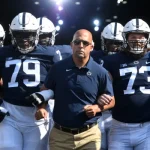How Recruiting Has Rendered Coaching Obsolete in College Football
By: Chad Wilson – Editor Gridironstuds.com Blog
 Remember the Junction Boys? They were a merry band of Texas A&M college football players looking to become men that were steered into Junction, Texas by then coach Paul “Bear” Bryant in 1954. Bryant took those young men into Junction because he felt they were weak and poorly coached. Bryant rolled up his sleeves and poured his heart and soul into coaching young boys into men. Yes, football was the main dish but life lessons were what blossomed out of it. Along the way there were casualties. Players quit as they were overcome by the intense 100 degree heat, brutal practices and meetings late into the night. Those that remained prospered. Two years later, Texas A&M were winners, three years later they were undefeated and conference champions.
Remember the Junction Boys? They were a merry band of Texas A&M college football players looking to become men that were steered into Junction, Texas by then coach Paul “Bear” Bryant in 1954. Bryant took those young men into Junction because he felt they were weak and poorly coached. Bryant rolled up his sleeves and poured his heart and soul into coaching young boys into men. Yes, football was the main dish but life lessons were what blossomed out of it. Along the way there were casualties. Players quit as they were overcome by the intense 100 degree heat, brutal practices and meetings late into the night. Those that remained prospered. Two years later, Texas A&M were winners, three years later they were undefeated and conference champions.
The Junction Boys experience nowadays would undoubtedly get a coach fired and perhaps even in jail. While I am not advocating for college football coaching to result in a near death experience, I am calling out the profession for being less and less about development and more about talent acquisition. They say we don’t make anything anymore in America. Well it seems football players are slowing being moved onto the list of things we don’t create. College football coaches used to look forward to the time when they could land an unpolished specimen onto their campus and through the ways of their teachings mold that specimen with a ton of desire into a viking armed to conquer all before him.
In today’s game, a college football coach’s primary responsibility is not to develop the talent that comes through the door at his university. The main goal today is to find the best and most fully developed 18 year old he can so that he may curry favor with his fan base and remain in power. College football has become all about the recruiting war and the scramble for the 5 star athlete. If he can dunk a basketball he makes a tremendous football player. If he’s a tremendous hurdler, he is a playmaker on Saturday. Left in the wake of this hunt for fully developed 18 year olds are solid route runners that are not the desired height or weight. The intelligent middle linebacker that can sniff out a play before the QB yells hut but does not weigh enough.
Few college football programs are looking to develop talent anymore. They say they do but most coaches at major college football programs know that they will quicker lose their job for failing to land that 5 star in their backyard than for ‘jimmy” failing to make a single play vs. the in-state rival. The time that used to be spent conjuring up drills to get that offensive tackle to make that reach block are now consumed by scouring of Internet reports to find the next offensive tackle to replace that “bust” we recruited last year.
This phenomenon has contributed to the parity we are beginning to see in college football. Lesser known and historically significant programs are picking up the good football players cast aside by the big time schools. These programs are investing some time into polishing up the players that have actually displayed the ability to play the game. They spend less time trying to recruit premature replacements and more time brushing the dust off their recruits to find the gem. The big time schools in love with “athletes” are in waste mode. They burn through these recruits year after year. They are quick to call them busts and even quicker to bring in another guy that looks just like him next year and hope he can play football.
For this new generation of football player, their development has been placed in the hands of outside trainers, YouTube videos and their own understanding. Coach is becoming more of a title and less of an action. First question to the coaching applicant is about their ability to recruit. Soon, former defensive backs will coach offensive linemen if their addition to the staff means that they will land 2 or 3 more 5 stars in the next recruiting class. Good luck learning that kick step.
At the end of the day, that fully developed 18 year old or 19 year old senior that dominated in high school (because that’s what fully developed kids do) gets stuck at age 19 for the next four years. The focus isn’t on developing that 19 year old past his entry status. It’s about hoping he can play vs. 21 year old men on Saturday but just in case he can’t, let me log on to Rivals.com and find the next one.

Chad Wilson is a college football recruiting expert and creator of the GridironStudsApp which allows high school football players to gain exposure to college football coaches and fans. Wilson is a former college football player for the University of Miami (92-94) and Long Beach St. (’90-’91) and played briefly for the Seattle Seahawks (’95). He is also a former youth and high school football coach for over 15 years most recently for 5-A State of Florida Champs American Heritage. He runs All Eyes DB Camp a defensive back training company located in South Florida IG: @alleyesdbcamp. Wilson’s oldest son Quincy plays in the NFL for the New York Giants and his younger son plays cornerback for the Arizona Cardinals.



